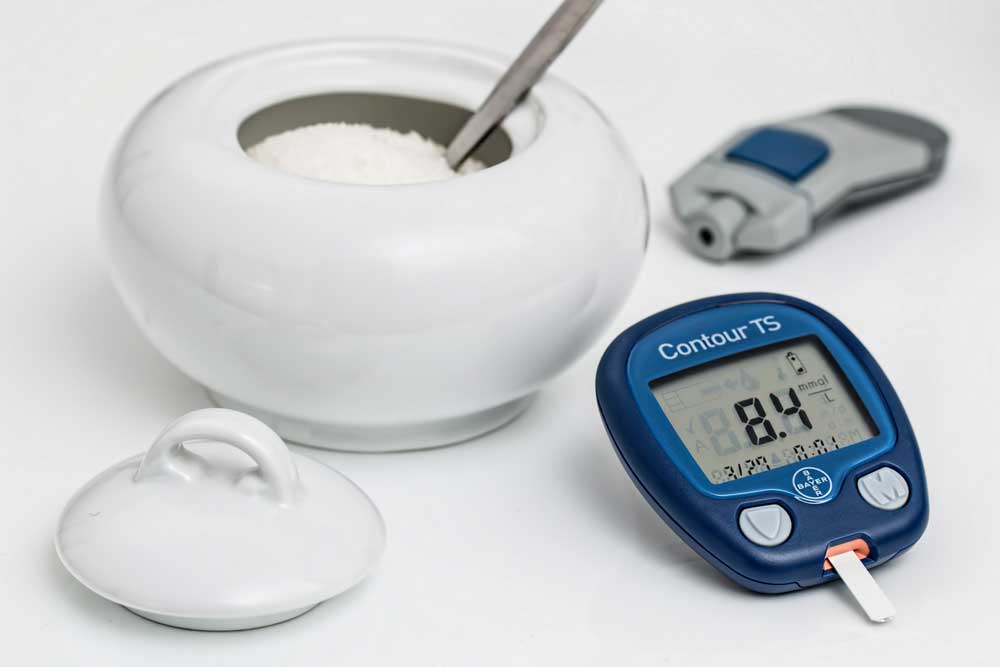
by Ingredia USA | Nov 15, 2021 | Blood Sugar Management
When you have diabetes, you have to take care to check your blood sugar levels multiple times each day. You may even have to administer diabetes medication or inject insulin when you notice that your levels are too high or too low.
If you are new to all of this, it can be difficult to figure out what is causing your levels to spike or drop depending on the time of day or what you’ve eaten. You’re not alone. In fact, there are approximately 32.4 people in the United States who have diabetes and have to monitor their glucose levels to get through the day.
Continue reading to learn what causes abrupt changes in your blood sugar levels. You’ll also learn how to better manage blood sugar.
What Affects Blood Sugar Levels?
Several things may play a part in the fluctuation of your blood sugar levels. However, everyone is different. What affects one person might not even affect the next.
Dehydration can cause your blood sugar levels to spike. When you don’t drink enough water, there isn’t enough water in your bloodstream to balance the amount of concentrated glucose that is present in the blood. When this happens, you’ll notice a spike in your blood sugar levels.
Eating carbohydrates at all will cause your blood sugar levels to rise due to them being turned into sugars to give you an energy boost. This is normal. However, eating too many carbohydrates can cause a huge spike making you feel off. Fatty foods may also cause you to feel sluggish and increase your blood glucose level. It can even cause your body to become resistant to insulin.
You may also find that eating too frequently or at the wrong times can cause your blood sugar to fluctuate.
The fluctuation of hormones (due to any number of reasons) can mess with your blood sugar. When you are ill or dealing with an infection, your body will increase hormones (while also increasing blood sugar levels) to fight off the virus or bacteria.
An increase in testosterone for men and estrogen for women can cause an insulin reaction. For women, life events like pregnancy, menstruation, and menopause can cause a fluctuation in hormones causing high blood sugar.
Stress can cause your blood sugar to skyrocket. It can also cause you to develop insulin resistance.
All of these things can cause you to struggle with managing your blood sugar.
Changes In Blood Sugar Levels
Your blood sugar levels may fall in a safe range (70 to 126 mg/dL), but when it’s too high or too low, problems may occur. There are two types of changes that occur when the amount of glucose in the blood isn’t balanced.
Hyperglycemia
When there is too much glucose (more than 126 mg/dL) in your blood, you are experiencing hyperglycemia. In the long term, hyperglycemia can cause issues with kidney and eye disease. Heart attacks and strokes are possible. Long-term hyperglycemia can also cause nerve damage and circulation disorders.
When experiencing hyperglycemia, you might notice:
- Increased thirst (polydipsia)
- Increased hunger (polyphagia)
- Increased urination (polyuria)
- Dry mouth (xerostomia)
- Fatigue
- Anxiety
- Blurred vision
- More infections
- Slowed healing (cuts and sores)
These symptoms occur when:
- You eat too much food
- You don’t get enough physical activity
- You skip doses of medication and meals
- You get stressed
- You are ill or have an infection
Getting your number to come down so that you begin to feel better is very important to your health and wellbeing.
Hypoglycemia
When there is not enough glucose (less than 70 mg/dL) in your blood, you are experiencing hypoglycemia. Hypoglycemia prevents the body from functioning in a normal capacity.
Hypoglycemia symptoms include:
- Sweating
- Shaking
- Hunger
- Dizziness
- Weakness
- Headache
- Fainting
Your blood sugar is likely to drop when:
- You don’t eat enough food
- You overexert yourself with physical activity
- You take too much insulin or diabetes medication
- You drink too much alcohol without eating
In severe cases, it can lead to confusion, seizures, unconsciousness, coma, or even death. Because of the weakness, you may find yourself in a position where you can’t eat or drink and you can’t administer your medications. This can lead to unconsciousness and even death.
How Can You Maintain Safer Blood Sugar Levels?
You will find that maintaining a safe blood glucose level comes naturally when you:
- Drink enough water
- Avoid skipping meals
- Take your medication on time
When you have extremely low blood sugar levels, it’s important to remedy the situation immediately. You can do this by taking glucose tablets, drinking fruit juice or regular soda, or eating some hard candy.
Blood sugar management plays a huge role in your success. You will want to accurately time your intake of food and administering your medication. It’s important to monitor your blood sugar levels, food intake, medication, and physical activity. Writing it down in a journal along with symptoms you may be feeling can help you to keep an accurate record.
You can use the journal to communicate effectively with your doctor and to track how you feel when your glucose levels are out of sorts.
If you are having an issue with regulating your blood glucose levels, Pep2Dia, a patented milk protein hydrolysate, might be able to help you out.
Managing Your Blood Sugar Levels
It’s important to your overall health and wellbeing to manage your blood sugar levels. Make sure you are taking the precautions that you should be to keep your blood sugar at a healthy level… not too low and not too high.
Contact us today for more information on blood sugar management and what you can do to keep yourself within your target level. We’d be happy to answer any questions you might have about using Pep2Dia to help regulate your blood sugar levels.

by Ingredia USA | Nov 9, 2021 | Stress Management & Sleep Disorders
Did you know 80% of people report that they feel stress from work at least sometimes? Some reports have indicated that 60% of people that call in sick are just suffering from work stress.
Managing stress is an important skill to learn because stress from work is a growing trend. Many jobs require their employees to work long hours. Staff doing the jobs of multiple people.
If you are nodding as you read this, you are likely to experience work stress, too. Keep reading to learn some tools for stress management.
Focus on Work Wellness to Minimize Work Stress
There are many small things that you can do to keep work stress to a minimum. You can reduce anxiety levels, too.
Not all workplaces allow for these things. If your office has rules that make it difficult for you to make it less stressful, consider putting together a proposal to allow employees to create a less stressful environment.
If your managers see that reducing stress at work is to their benefit, they may reconsider rules that prevent stress management techniques.
Stay hydrated to keep your brain active and increase the chances of managing stress better. When you are properly hydrated, you can handle problems better. Bring a water bottle and keep it on your desk
If there are not plants in the office, ask your employers if you can bring some in. Green plants improve the quality of the air. They also have a calming effect.
Minimize artificial light. Maximize natural light. Encourage everyone to open the blinds and let the sunshine in.
Work Friends Decrease Stress from Work
Work is less stressful when you get along with the people you work with. They don’t have to be your best friends. You just need to get along.
Team building exercises can encourage friendship and laughter. You can also organize activities outside of work like bowling, picnics, and group dinners.
If your work doesn’t have these activities already, be patient. Find a few people to get on board with reducing stress on the job. As others hear about the fun you are having, they will join in.
Other things you can do to help people create work friendships include having a mentorship program. You can also discourage the smartphone lunchroom by putting down your phone and starting conversations.
Live a Healthier Life to Manage Work Stress
When you are stressed, you may turn to high-fat, high-sugar snacks for comfort. These foods don’t help.
When you eat junk food, you feel tired and lethargic. Your brain feels like mush. That makes it difficult to focus and the stress increases.
A diet high in sugar can also lead to weight gain and high blood sugar. When you’re stressed, your insulin levels fall, increasing your cortisol levels which makes you crave junk food.
Lower insulin levels mean your blood sugar increase and your stress levels rise creating a cycle. Stress and blood sugar levels are correlated. Each one increases the other.
Plan for snacks. High fiber food like fruits and vegetables and complex carbohydrates can fill the need to eat. They also give you energy and help your brain work better.
Managing work stress through health choices is not only about what you put in your mouth. It’s also about what you do. Exercise is a great tool to minimize stress from work.
Life can be hectic though and it can be difficult to get to a gym or go for a run. You can exercise while you’re at work though.
Start a walking group during the lunch hour. Use coffee breaks to do some stretches at your desk. Have walking meetings where everyone walks and talks.
Organize for Better Stress Management
One of the biggest causes of work stress is too much work or too many types of work. If you don’t know what to do first because it is all important, you will feel more stressed.
To minimize stress because of workloads, you need to be organized. If you prioritize your work tasks, your objectives for the day will feel more clear.
Put tasks that get you closer to your end goals first. These are your priorities. Chose up to three tasks to prioritize each day.
Set deadlines to reduce work stress. When you know you need to complete a task by a certain time, you can focus on the most important tasks first.
Having a plan is a good tool for reducing stress. Find a planner system that works for you and utilize it each day.
Take Breaks, Lunches, and Vacations
If you are working through your breaks and lunches, stress is going to follow. Your brain needs time to relax. You need to be able to unwind during the day.
Take your breaks and your lunch hours. If you can, leave the office. Meet a friend for lunch.
If you can’t leave the building, utilize those work friendships you have been building. Take time to talk about something other than work.
Vacation time is your right. Employers will sometimes discourage you from taking it because it’s a busy time of the year or it’s just not the right time. Vacation time is your right though, so take it when you can.
Vacations don’t need to mean an expensive international trip. A relaxing vacation could just be spending time with family and loved ones. The key is to not think about work!
Be Proactive in Managing Stress
If you let it, work stress can take over your life. It can affect your family life, your physical health, and your mental health.
To minimize work stress, you need to take an active role in creating a healthier lifestyle.
Want to learn more about how you can maximize your health and minimize work stress? Learn more about us here.

by Ingredia USA | Nov 1, 2021 | Blood Sugar Management
According to the latest research, approximately 34.2 million Americans (that’s 10.5 percent of the population) have been diagnosed with diabetes.
Are you part of this group? Do you need help figuring out the right diet that will help you with your blood sugar management?
If you’re not sure where to begin, read on.
Listed below are some foods you can add to your meals today to regulate blood sugar and start feeling better. We’ll also share some foods you can eliminate to achieve the same result.
Broccoli
Broccoli makes a great addition to your diet if your goal is diabetes self-management.
Both broccoli and broccoli sprouts contain sulforaphane. Sulforaphane is a plant chemical that’s produced when broccoli is chewed or chopped. It has antidiabetic effects and helps to lower blood sugar, as well as oxidative stress markers, while also increasing insulin sensitivity.
Broccoli is also a good source of fiber. Eating plenty of high-fiber foods can help you to avoid blood sugar spikes and stay fuller longer, which can be useful if you’re trying to lose weight and need help resisting cravings.
Seafood
Fish and shellfish are excellent sources of protein. Eating a high protein diet can help you to keep your blood sugar levels under control and feel more satiated after a meal is finished.
It’s important to note, too, that fatty fish are also beneficial for blood sugar balance. For example, salmon and sardines have been shown to produce more stable blood sugar levels after eating, even better than leaner types of fish.
Pumpkin and Pumpkin Seeds
Pumpkin and pumpkin seeds are both tasty and healthy foods to include in your diet for better blood sugar. Pumpkin contains fiber and a type of carbohydrate known as polysaccharides. Polysaccharides have significant blood sugar-balancing properties.
Pumpkin seeds are also beneficial because they contain magnesium. Magnesium is a mineral that is known for balancing blood sugar. As a bonus, it has relaxation-promoting properties, too.
Beans and Lentils
Beans and lentils are also good choices. They’re packed with magnesium, fiber, and protein, all of which help to lower blood sugar.
Research also shows that people who add beans and other legumes to their high-carb meals have lower post-meal blood sugar levels than those who don’t.
For those who have not been diagnosed with diabetes but are still concerned about blood sugar balance, adding beans and lentils to your diet now could make a big difference. Another study shows that these foods may help to prevent diabetes.
Strawberries
Many people assume that they have to give up fruit altogether when they’re working on managing blood sugar. That’s not true, though.
Strawberries are a sweet (but low sugar) fruit that can easily be added to your diet for better blood sugar levels. They contain fiber and antioxidants, too, which can reduce oxidative stress and keep your cells healthy.
Other types of berries are also beneficial to those dealing with blood sugar issues. Blueberries, blackberries, and raspberries offer their own unique benefits, but they’re all good sources of antioxidants and fiber (without a lot of sugar).
Nuts
Nuts, from almonds and cashews to pistachios and walnuts, are great snacks for those who need help keeping their blood sugar under control.
They’re good sources of healthy fats, and they also contain fiber for better blood sugar balance.
Some nuts also contain omega-3 fatty acids and vitamin E, too. These nutrients can help to prevent blood sugar spikes and they protect your heart!
Oatmeal
Oatmeal isn’t just a tasty and versatile breakfast food. It can also help you to avoid blood sugar spikes and drops (as long as you don’t load it up with sugary toppings).
Oatmeal is packed with fiber, which lowers blood sugar and improves insulin sensitivity. To add more flavor to your morning (or afternoon or evening) bowl, consider adding other toppings that have blood sugar management benefits, such as strawberries or nuts.
Eggs
Eggs contain protein and healthy fats, and they can help to improve insulin sensitivity while also decreasing inflammation. They contain antioxidants, too, which protect against free radical damage and oxidative stress.
It’s important to remember that the egg yolk is your friend. Don’t throw it out, as it contains the majority of the nutrients.
Olive Oil
Healthy fats help to prevent blood sugar spikes. They also add more flavor to your food and make your meals more satisfying.
Olive oil is a great example of a healthy fat source that you can add to your diet to control blood sugar levels.
Olive oil contains monounsaturated fats, which are known for their heart health benefits, and it’s a good source of antioxidants. Combine it with some apple cider vinegar and spices to make a simple, tasty salad dressing.
Foods to Avoid for Better Blood Sugar
When it comes to learning how to manage blood sugar, there are plenty of wholesome foods you can add to your diet. At the same time, though, you may need to cut out or reduce your intake of certain things to really see progress.
Here are some examples of foods and drinks to avoid or enjoy only on occasion:
- Sugar-sweetened beverages (such as soda, fruit juice, etc.)
- Fried foods
- Sugar-sweetened cereal
- Packaged snacks (such as chips, crackers, cookies, etc.)
These foods are more likely to cause blood sugar spikes and crashes. They can also contribute to an increased risk of other health issues, such as heart problems or obesity.
Time for Better Blood Sugar Management
Not that you know more about the benefits of a healthy diet for blood sugar management, it’s time to start making some changes. Keep the tips listed above in mind so you can start regulating your blood glucose levels and making your health a priority.
Do you want to learn more about managing blood sugar? Do you need help with stress relief so you can manage diabetes more easily?
If so, Ingredia may be able to help. Contact us today to learn more about our research and how we’re working to revolutionize the dairy products you know and love.

by Ingredia USA | Oct 24, 2021 | Other News
Dairy products are a type of food produced from the milk of mammals, most typically cows, and include milk, yogurt, and cheese. According to studies, humans have been consuming milk for around 6,000 years. While there is ongoing debate in some quarters over whether consuming dairy products is good or bad for your health, there is no denying the health benefits of dairy.
Of course, not all dairy foods have been created equally. For example, here at Ingredia, we create higher-quality dairy ingredients through cutting-edge technologies and innovative solutions. That way, you will reap more of the benefits of consuming milk and other dairy products in an ethical and sustainable way.
In this blog post, we will highlight seven benefits of consuming dairy foods in your diet.
1. Lower Risk of Type 2 Diabetes
In the United States, it is estimated that more than 34 million people have diabetes, with the vast majority having type 2 diabetes. This equates to around one in every 10 Americans and can develop at any age. Consuming dairy products can help to reduce your risk of developing type 2 diabetes.
Dairy improves insulin sensitivity which enhances our bodies ability to regular blood sugar levels. Studies highlight how consuming more dairy products can lead to a significantly lower risk of developing type 2 diabetes.
Even if you are already diabetic, dairy products are recommended. Dairy products with a low glycemic index are beneficial as they are a positive source of nutrients without affecting blood sugar control.
2. High Nutrient Content
Put simply, dairy products are highly nutritious. A single cup of milk (237 ml) contains a range of nutrients. These include calcium (28% of the recommended daily intake), vitamin D (24% of RDI), riboflavin (26% of RDI), and vitamin B12 (18% of RDI).
Other key vitamins and minerals found in dairy products include magnesium, phosphorus, potassium, and vitamin A. It is worth pointing out that dairy from grass-fed cows will be more nutritious than other sources of dairy.
Milk is also regarded as a complete protein, meaning it has all of the nine essential amino acids needed in the body. Dairy products are typically high in protein, a key nutrient that helps in the repairing of cells, regulation of the immune system, and muscle development.
3. Lower Risk of Obesity and Weight Gain
A number of studies have highlighted the link between dairy consumption and a lower risk of obesity. Given that dairy products have high levels of protein, which has the effect of making you feel fuller after eating, you are less inclined to overeat and consume too many calories.
Dairy consumption can help to increase our bodies’ lean body mass and reduce body fat. Another study looking at diary consumption in children and young adults highlighted that there is no association between dairy products and obesity.
4. Improve Gut Health
Fermented dairy products are closely associated with benefiting our gut’s health. Fermented foods that contain live cultures add beneficial bacteria to our digestive tracts and aid digestion and gut barrier function.
Products such as yogurt are easily available sources of probiotics, which can help to maintain the natural balance of our guts’ microbiota. While an often overlooked benefit of consuming dairy products, improving gut health is a strong positive linked to regular consumption of dairy.
5. Get a Better Night’s Sleep
In this non-stop, 24/7 modern lifestyle, it can be very difficult for humans to get enough quality sleep. Sleep is an essential function, allowing our minds and bodies to recharge and stave off illness.
Thankfully, dairy products contain a number of compounds that are known to support healthy sleep cycles. A number of studies have demonstrated the link between the consumption of dairy products like milk and a restful night’s sleep.
Tryptophan and melatonin, two compounds found in dairy products, are believed to be linked to helping you fall asleep. It is also believed that routinely consuming dairy products before bed is beneficial, as a calming bedtime ritual.
6. Improved Bone Health
We all know that dairy is an excellent source of calcium. A diet that is rich in calcium helps to improve our bones’ overall health and a lower chance of developing osteoporosis.
Osteoporosis is a health condition that can weaken bones and make them more likely to break. This condition generally develops over a number of years and can be offset by a diet rich in milk and other dairy products.
7. Improved Dental Health
As highlighted already, dairy products are high in calcium and phosphorous. These two minerals work together to strengthen our enamel, helping to keep our teeth strong and healthy.
Regular consumption of dairy is also good for our gum health and can lead to a lower incidence of gum disease. In children, dairy products such as milk, cheese, and yogurt are encouraged to help boost teeth health and growth.
Discover the Health Benefits of Dairy Products Yourself
As this blog post highlights, there is a wide range of important health benefits linked to the regular consumption of dairy products. Dairy products are high in essential nutrients such as calcium and are closely linked to a lower risk of type 2 diabetes and obesity. They are also linked to improved sleep, gut health, bone health, and stronger teeth.
Since 2009, Ingredia has been creating higher-quality dairy ingredients in the US. Our clinically-approved dairy ingredients provide all kinds of health and lifestyle benefits. With our products, you can boost immunity and digestive health, regulate blood sugar levels, and promote muscle and bone health.
Check out our activities here to discover the health benefits of dairy and learn more about why Ingredia is your partner in health.

by Ingredia USA | Oct 18, 2021 | Blood Sugar Management
Picture a brussels sprout in your mind.
Whether you’re currently gaging or dreaming about new recipes, you have an opinion. How does such a tiny vegetable elicit such a strong response?
Kids begin to form their opinions about food at a young age. As a parent, you’re responsible for helping your child to form healthy opinions and habits. Your child’s earliest experiences with food will inform what they eat for life.
Ready to raise a healthy eater? It’s never too late to teach your child about healthy eating habits! Read on to learn how to help your child develop healthy eating habits – without tears.
Healthy Eating Habits in Kids
All kids follow unique developmental pathways. Your child’s pathway toward healthy eating will have just as many twists and turns. What your child will encounter on their journey is up to their parents and caregivers.
Encouraging healthy eating habits for children must begin with a critical examination of your own eating habits. Begin by exploring your own behavior around food. Children hear and see everything, and your internal biases can impact their reactions at the table.
Do you have a verbal response when you encounter food that you don’t like? Do you insist on a clean plate? Do you discuss diets or food restrictions where children can hear?
Once you have taken some time to recognize your own language and behavior around food, you can begin to change it in subtle ways.
If you don’t want your child to throw a fit when you serve them vegetables, you shouldn’t throw one, either! If you want your child to notice their body’s fullness cues, don’t insist on a clean plate. If you want your child to select food for its nutritional value and satiating qualities, keep diet talk to a minimum.
You might find that this helps impact your own health and wellness journey in positive ways! Once you have made a few small adjustments, there are a few explicit tips and tricks that you can try.
Eat as a Family
The trope of ‘the family dinner’ has become a trope for a reason! Children need to see how adults eat, interact with, and talk about food. This is how they learn table manners and healthy eating habits.
Even the youngest children can benefit from a seat at a table! Mobile infants and toddlers are observant and love to model behavior that they see. Pull up the highchair and let your little one join the table, especially if they show interest!
Eating together as a family is also a great way to encourage mindfulness surrounding food. The focus should be on food and conversation, not distracting screens and media. This will help children notice fullness and hunger cues and respond to the needs of their bodies.
Some children pick away at meals or avoid their plates altogether, especially if you allow them to play at the table. The family meal should be an efficient affair. All family members should strive to enjoy their meal during a reasonable period of time.
Keeping to a regular, predictable meal schedule can also help children eat mindfully. Kids are naturally drawn to routines, and bodies are, too. With routines in place, your child’s hunger cues will sync up with meal and snack times, and there will be fewer battles at the table.
Offer Variety
Children, like adults, can form unconscious biases about what they think they like. A bad experience with spinach might lead to trepidation surrounding broccoli. Provide variety, and encourage tasting, but don’t demand a clear plate.
Remember that children need many exposures to a new food before they can decide if they like it. They might need to see the food on their plate as many as twenty times to form a clear opinion!
Some children do have an anxiety response to certain foods, and this is a normal part of development. Continue to offer these foods, but don’t force-feed or require that they taste anything that is causing distress. Instead, model your own enjoyment, and talk about the positive effects of the food on your body.
For example, you might say, “I like broccoli because it makes my body feel warm and energetic. It helps fill my belly up quicker and makes it easier to go to the bathroom.”
If a child shows an adverse response to a food, take it out of the rotation for a few days or weeks and try again.
Furthermore, do not confuse offering variety with cooking to order. Children should be free to make choices, but not demands. If they only gravitate toward one part of the meal, talk to them about what they liked about it and why.
Over time, you will learn more about your child’s palette. At the same time, your child will begin to learn the importance of healthy eating habits.
Food Is Not a Reward
Never use food as a reward or withhold it as a punishment. This includes requiring children to “earn dessert” by cleaning their plates. You may ask that your child eat some of their meal before serving dessert, but attaching such strong associations to “good foods” and “bad foods” can be damaging.
Furthermore, don’t withhold certain foods, regardless of your child’s body shape or size. Instead, take the opportunity to talk about moderation and “sometimes” foods. Nobody needs to eat ice cream every day, but nobody deserves to live in a world without it!
Healthy Eating Is a Family Affair
Raising healthy eaters begins with a healthy awareness of your own internalized feelings toward food. Once you have acknowledged and addressed those ingrained feelings, you will be on your way to building healthy eating habits in your child. Embrace these tips, and you can raise a healthy eater!
Ingredia is on a mission to encourage healthy eating habits in children and adults across the country. If you would like to learn more, contact us to learn about how we are making dairy products healthier for everyone.





